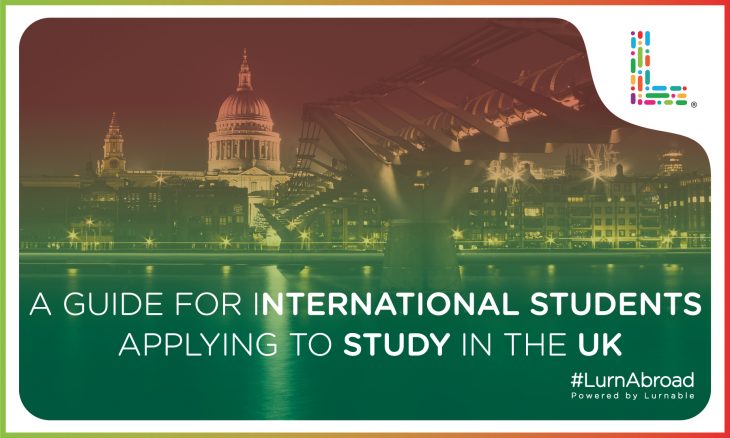Considering moving to the UK to pursue a degree? We’ve got you covered. This article will give you guidance on the entry requirements, entrance exams, fees, deadlines and funding opportunities for studying abroad in the UK.
You may be asking yourself, where is the best place to study abroad for me? One excellent choice is the UK, where a whopping 605,130 international students pursued their degree in 2021 alone. So why are so many students looking to study in the UK? Notably, when you study abroad in the UK, you can expect a high quality education which is recognized world-wide. The UK is also one of the most affordable countries to study in and offers an abundance of financial support for international students.
ENTRY REQUIREMENTS FOR STUDYING ABROAD IN THE UK
For an international Batchelor’s Degree, most universities require at least 3 A-Level or equivalent qualifications, graded at BBB (or an IB Diploma of at least 34). Entry requirements differ depending upon university choice, so check what your individual university requires.
Not Accepted to Study Abroad at University?
If you are not accepted into a UK university, you can be accepted by applying through clearing.
In the unfortunate event that you are not accepted to study in the UK through clearing, you still have several options. You can do a foundation diploma or re-sit your A-Levels (or equivalent qualification) to get accepted onto the degree. As an international student, you can also do an apprenticeship or vocational course in the UK to access these qualifications.
Two top universities for Environmental Science are St Andrews and UCL.
- The minimum qualification required at both of these universities is AAB.
- To study abroad at St Andrew’s university you need to have two of the following A-Level (or equivalent) subjects; Biology, Chemistry, Geography, Geology, Mathematics or Physics.
If you were not educated in an English speaking country, standard UK Universities also require that you take a language proficiency exam to evidence your English speaking abilities. The most commonly accepted English exams for international students studying in the UK are IELTS, TOEFL, PTE, C1-Advanced. The typically required IELTS score for studying in the UK is 6.5 – 7 and the TOEFL score is 70-110.
These listed university admission exams are not exclusive and universities will vary on their test preferences and score requirements for international students. Check your university’s website to see what scores and tests are accepted.
No aptitude tests are required for most BSc’s in the UK. However, for Masters applications, some universities may allow you to optionally take aptitude tests to enhance your international degree application.
To apply for university in the UK, you must produce a personal statement. This is crucial and will set you apart from other applicants. When writing your personal statement, focus on your experiences and use them to tell the reader why you are the best candidate for the role. This is your opportunity to show the university why you are inspired in the subject (& university) and what you can bring to the university’s scientific community.
Some Useful Tips to Boost your International Student Degree Application:
- Want to stand out from the crowd with your impressive degree application? Here’s our top tips on what you need to do.
- What excites you in your Degree subject? Enjoy your favourite books, videos and podcasts on the topic! You can even find live talks and seminars on YouTube and at your local university.
- This is a fantastic way to expand your knowledge and will help you demonstrate your inspirations when you come to write your personal statement.
- Attend summer schools.
- This looks great on your application, and can increase your confidence. Not to mention, the friendships you can make with people in the field.
- Did you know that you can do online courses for free? This is a great way to get that needed support and preparation for your course.
- Enter competitions. Not only will this boost your application, it will also provide you with rewarding educational experiences that have a real impact in your industry.
- Take part time jobs and internship programmes to lend you experience in your degree area.
ENTRANCE EXAMS FOR STUDYING ABROAD IN THE UK
International students studying abroad in the UK are required to take language exams. The following is a list of commonly accepted language exams for UK university admission.
Follow your universities guidance to decide which language course is best for you.
IELTS and TOEFL Exams both assess your English Listening, Reading and Writing skills. These tests can be taken at a local test centre or online from your home.
IELTS Exams:
- Time Length – The test takes approximately 3hours to complete.
- Cost – The test price range is £105-£233. Fees will vary depending on the country in which you take the test.
- Score Required – The standard IELTS score required for university admission in the UK is typically 70-110.
TOEFL Exam:
- Time Length – The test takes approximately 4hours to complete.
- Cost – The test price range is £120-£169. Fees will vary depending on the country in which you take the test.
- Score Required – The standard required TOEFL score for university admission in the UK is typically 6.5-7.
Preparation:
- The preparation time for these exams is approximately 2-3 months.
- To prepare adequately, ensure that you do plenty of revision and practice mock exams.
- Here are some revision tips:
- Practice listening by watching videos and translating them.
- Read articles and books in English.
- Read up on the rules of English grammar.
- Practice your writing.
- Take certified online courses to help you learn English.
- Take advantage of free apps which can help you practice your language skills (such as Duolingo & Rosetta Stone).
UK UNIVERSITY APPLICATION PROCEDURE
To study an undergraduate degree abroad in the UK, submit your application through UCAS.
Once you have created a UCAS account, UCAS will walk you through the information needed to apply. You will need to submit this information through the UCAS platform.
Once your application has been submitted, you may be asked to have an interview with the university. Prepare for your interview. Next, you will need to apply for a visa and arrange your university funding (e.g. apply for Scholarships etcetera).
Following this, it is likely that you have been successful in your UK degree application! Here, the university will offer you a place on the course and you will need to accept this place.
Didn’t get into your UK University?
Unsuccessful degree applications can occur and cause frustration and demotivation. Stay calm, its okay, there are still options out there! You can get into UK universities through clearing, do a foundation course or resit your A-Level (or equivalent) exams.
This is the standard academic route for getting into a UK university as an international student. However, you may also be able to access the course by other means. For instance, you could take apprenticeships which offer the qualifications needed to access the course.
UK UNIVERSITY APPLICATION DEADLINE
The earliest deadline for international student degree applications in the UK is the 15th October. However, this varies depending on your chosen university so check your university website.
You will need to start your preparation at least 6months early to ensure that you meet this deadline.
UK UNIVERSITY APPLICATION TIMELINE
- You can begin applying through UCAS as early as May. You will need to start early to ensure that you have enough time to prepare.
- Language Test: Mid-April 2022. Register for and take your language test at least 6 months prior to your application deadline to ensure that there is sufficient time. This is required for your test results to be processed and for you to re-sit exams, should you need to.
- Begin Application: Mid-June 2022. You will need at least 4 months to shortlist your chosen university, prepare for any extra tests (if required), start collecting references and begin writing your personal statement.
- Secondary/Higher Education Results released: August 2022. Your A-Level results (or equivalent) will be released, submit your transcript of certification on the UCAS platform.
- Interviews: Nov-April 2022. If requested by your university, you will begin interviews during this time-scale.
- Application Deadline: 15th October 2022. This is the earliest UK University application deadline by which you may be required to submit your application.
- Clearing Applications: 30th June 2023. If you did not get into university by the conventional route, this is the earliest time you can apply for clearing.
Application deadlines vary by university, so check your deadline before you plan your preparations.
Ensure that you also make early preparations for your Visa and funding required to study in the UK.
FEES FOR INTERNATIONAL STUDENTS STUDYING ABROAD IN THE UK
International students can expect to pay as little as £3,925 per annum for UK university undergraduate degrees, this can go as high as £9,250 per annum. For postgraduate study in the UK, fees are most often around £8,910 but can go as high as £16,500 depending on your chosen university.
SCHOLARSHIPS AVAILABLE FOR INTERNATIONAL STUDENTS STUDYING ABROAD IN THE UK
There is an abundance of financial support in the UK for international students, so you may be able to study abroad in the UK affordably and even often for free!
This support includes scholarships, bursaries, fellowships and grants, which are provided by universities, trusts and charities to international students. Your eligibility for this funding will depend on your grades, potential, income, country, situation and gender. Check your university website to see what international student funding you may be eligible for.
Additionally, you can apply for government loans specific to your country, so check what your country has to offer.
We sincerely hope that this article brought you some reassurance in your plans to study abroad and enlightened you on your options. If the UK does not seem like the right option for you, there are several articles on our website available for you to explore other countries.

If you are considering studying abroad why don’t you discuss your prospects and opportunities with experts at Lurnable’s dedicated study abroad counselling division LurnPathways?






